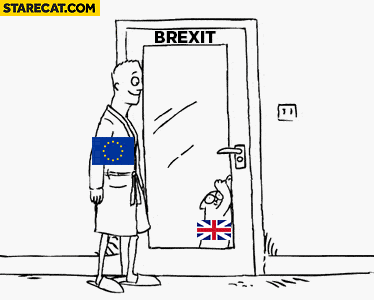So it has come out in the news over the past couple of weeks that the UK’s Owen Smith, who is currently challenging Jeremy Corbyn for leadership of the Labour party, will call on Theresa May to hold a second referendum with the people of Great Britain before the triggering of Article 50, which would result in Britain leaving the European Union (EU).
As I’m sure many of you know, Britain voted to leave the EU in a tightly-contested referendum that was defined by poorly-made arguments on both sides, many people having little real idea of what they were voting and conspiracy theories about how the government were going to rub out the pencil crosses used to mark the ballots, so you should definitely bring a pen to avoid that. Oh, and a laminator seeing as paper can be just as easily torn. Something to make it completely fire-retardant too, seeing as paper can be burned. Yeah, that last one stuck in my craw a little bit.

You may be able to guess from the tone I’m taking that I was somebody who voted to remain. I won’t sit here and claim that the EU is perfect, by any stretch of the imagination. Frankly, no government entity is ever going to be perfect, Instead, I put the burden on the ‘Leave’ campaign during the run-up to the election to show me why I should side with them. All I got was the lies surrounding the famous £350 million figure that was being thrown around and lots of shouting about them bloody immigrants – who just so happen to contribute £20 billion a year in taxes into the UK’s coffers – either stealing all of the jobs or taking all of the benefits. Their doing a pretty good job if they manage to get both, those pesky immigrants.
So I fell pretty solidly into the ‘Remain’ camp, mostly because I don’t like being lied to. This means that this whole referendum prior to Article 50 idea should be a godsend right? Well, I’m not so sure.
The Will of the People
For all of the faults that were made by both sides in the build-up to the referendum, the fact is that this was, for all intents and purposes, the most democratic vote that has been held in the UK in my lifetime. Everybody had a voice and, more crucially, votes were simply tallied to create one winner over another, rather than all of the stuff we get about proportional representation in our elections.
In that sense, the vote to leave the EU was the will of the majority of the people. A slim majority, most certainly, but still the majority. There has been a lot said about how many on the ‘Leave’ side of the argument are disenfranchised with the system, with the experts and the way that the country is being run. There’s probably a little bit of validity to that and the result demonstrated a fairly clear divide, with London, Scotland and Northern Ireland generally standing counter to the rest of the country.
So what does it say to the people who voted if we trigger another referendum to decide whether we go through with Article 50? Would this be the government saying to the people that they want to give us a second opinion, now that we have seen some of the immediate after-effects of the decision to leave? The strength of pound sterling has dropped quite dramatically and there is still a lot of uncertainty in a number of industries, so there is some case to be made for that.
Or is this the government, or at least part of it, basically saying “You got it wrong the first time. Try and get it right this time?” That’s certainly the level of arrogance that I sensed watching the live coverage of the referendum, with more than one career politician coming out to say there should never be a referendum, essentially, because people would vote wrongly. These were invariable people from the ‘Remain’ group – my group – and it made me a little ashamed to rank within their numbers because it was so arrogant.
My side lost in the Brexit referendum. I don’t like it but that’s the truth. If we basically undo all of that I think we run the risk of fracturing the country even more, as we are basically telling the 52% of people who voted to leave that their voices don’t matter, especially if the second referendum results in a vote to remain.
You can’t leave something to the will of the people and then try to push them towards making another choice when you don’t get the result you want.

A Leadership Challenge
Moreover, this call for a second referendum smacks more of political ambition to me, rather than genuinely wanting to give the UK another chance to look at things. Jeremey Corbyn is something a little different in British politics and, to me at least, he is a breath of fresh air. For years we have been calling for somebody to be a little different to the Etonian regime that we have had at the top of all of the major parties and he offers that.
It’s probably also why he gets pilloried in the press and insulted by the same people who, in the same breath, would complain about all politicians looking the same.
However, Corbyn’s more considered approach is something that Smith, and other leadership candidates, can seize upon. Smith has already done it by challenging Corbyn to match his commitment to a second referendum. Is this because he genuinely wants to make Labour the opposition to the Brexit? I’m not so sure. As the representative for Pontypridd, which is the county town of Rhondda Cynon Taf, Wales, which voted to leave, I do wonder if Smith is representing the desires of his constituents with his stance.
Granted, he campaigned for Britain to remain, but I can’t help but feel this is more political grandstanding from somebody who is hungry for power, rather than aiming to give people what they want.
But What About The People?
Of course, the flipside to my wariness about challenging Article 50 is that the leave result alienates 48% of the population. The young voters in this country, in particular, voted pretty overwhelmingly to remain, even if they didn’t turn out in as high a numbers as they should have with only 64% voting, as compared to 90% of people over the age of 65. Still, this means that the decision to leave would place the people who will inherit, for want of a better term, Great Britain in a situation that they don’t want to be in.
Is that fair? Who’s to say? It can be argued just as fervently that older voters, who generally leaned towards leaving, have just as much right to dictate the course the country takes, seeing as they are still living in it.
It all comes down to the fractures I spoke about earlier. There is a divide in the UK and it can’t necessarily be measured by something as simple as age, or economic standing, though those are certainly factors. To me, it seems like a much more complex issue and we don’t really seem to be addressing it all that much, as the country appears to be trying to get back to a “business as usual” mindset.
The Challenge To Article 50
On the surface of it, I should be delighted that a politician is looking to challenge the referendum, if only because that gives me another chance to get what I wanted, rather than what the leave campaign wanted. I’m not going to lie an claim I’m happy with the way things are going and there was a certain smug satisfaction – mingled with genuine outrage – when I watched the likes of Farage, Boris and Gove all quietly slip out of the limelight when it came time to outline what they were going to do once they had gotten the result they wanted.
My worry is that the referendum brought to the surface a lot of tensions that were quietly bubbling away beforehand. If we hold another referendum on Article 50 and the remain side wins this time, that’s a lot of leave voters who are going to be completely disenfranchised with the political system, having not received what was promised to them if they won.
What would that mean for the UK? Would we just enter a spiral of repeated referendums? After all, if we vote remain the second time around then we’re tied at one-one. We’re going to need a tiebreaker to resolve it once and for all, surely?
I think the important question I need answered by Mr. Smith is what is he going to do justify the need for a second vote that doesn’t fall down to saying “Well…me and 48% of people don’t want this so we’re trying again?” How is he going to convince those who voted leave that they were wrong? Because if he can’t give answers to those questions, I fear those fractures are just going to get bigger and bigger.
I have been following the #brexit situation closely. After the final results, the situation got really out of hand. And the one that voted "leave" regretted their decision. I suppose if there is a 2nd referendum, the results would be different, seeing how Scotland reacted to "leave" results. Now, that Cameron is out of the game, I expect a different result. I strongly believe that people voted "leave" because of Cameron figure. His influence dropped significantly after his father's involvement in Panama paper came in the spotlight. There are also factors to consider such as lack of youth engaged in politics. Farage and Boris made a fool of themselves. In the end, I would really love to see a 2nd referendum. After #brexit, majority of Europeans realized that EU is founded in order to diminish power competition between West Europeans countries and maintain peace in the region and all over the world. (mind you: both world wars started in Europe)
Leaving will benefit England if their loving overlords allow it to continue.
The EU needs to delever and power down.
they are already delivering. I still don't see how leaving EU is going to benefit UK, while at the same time there are so many UK projects funded by EU and many SME benefits from free movement of people and money among EU countries.
funded by EU what?
who? their taxes? their banks?
If the UK need those projects they'll need to pay for them themsleves.
Its very simple, are you for decentralizing govt, or centralizing it?
Do you think its a good idea to belong to a political body in Brussels that won't allow your MP to vote on legislation? Why are they there? For moral support?
How is this a representative govt? Or is it not supposed to be? If so, my bad.
NOT paying a central govt in BRUSSELS to make decisions NOT in England's interest, is always a good thing. Taking back your power to make decisions in your interest is also a good thing. Giving your power away to people who do not live NEAR you is a bad thing. This is called decentralization. This is what made the US a great nation, until our States began relying too much on D.C. (this must stop)
I'm not sure why you think a parliament wherein your representative has NO power AT ALL is good?
The EU is a top down power structure.
Do you realize this?@thebluepanda its not a prediction, there is nothing to predict.
I am much more interested on how do you predict UK will be better off EU. I am still waiting for people that support #brexit for at least a valid argument.
It's a shame you share Owen Smith's vision of a tinpot democracy. If you look at the stats on this, polling data indicates that only 5% of those who voted to leave regret doing so and the same is true of those who voted to remain as well. Youth voters, me being one, have no excuse for such a poor turn out on their part. There is even proof that David Cameron sought to haul in as much of the youth vote as possible in the referendum by advertising the need to register to vote on Facebook to exclusively young voters.
As for Johnson and Farage, they made quite the opposite of fools of themselves, didn't they? After all, it was they who won the vote.
Your praise of the EU as an organisation 'for peace' is very telling indeed. Tell me, how has it helped to foster peace in the Ukraine when its officials, such as Catherine Ashton, actively encouraged revolution alongside the Americans? Did it help to prevent the break-up of Yugoslavia? The EU did not form into the political union you praise it as being until the early 1990s. What kept European countries from warring with one another after 1945 and the USSR at bay was NATO. Diplomacy is not exclusive to the existence of a political union which undermines the sovereignty of its members.
are you from Serbia? :)
Everytime i read Britain or UK i remember a ton of Brexit jokes ;P
what governance basically comes down to is:
do you wish to be governed locally or from afar?
If you trust unaccountable and unknown (to you) individuals who have as much reason to work in somebody else favor as in yours, you'll want Brussels dictating your laws.
The Greeks would have been better on their own.
Italy, probably as well.
Ireland, hell yeah, but they appear to love their captors like good Christians and don't care about accepting onerous debt. Not much self determination there.
The EU has benefited Belgium and German banks.
And D.C.
Maybe others but I can't see it on the surface.
;-)

funny, but..
is the horribly miscalculated and rapidly failing socialist experiment called the EU supposed to be that guy?
And why would the Brit cat wan't to get in? To rape poorer nations for their wealth?
Germany seems to have already taken the easy fruit, what's left for the Brit banks? Macedonia?